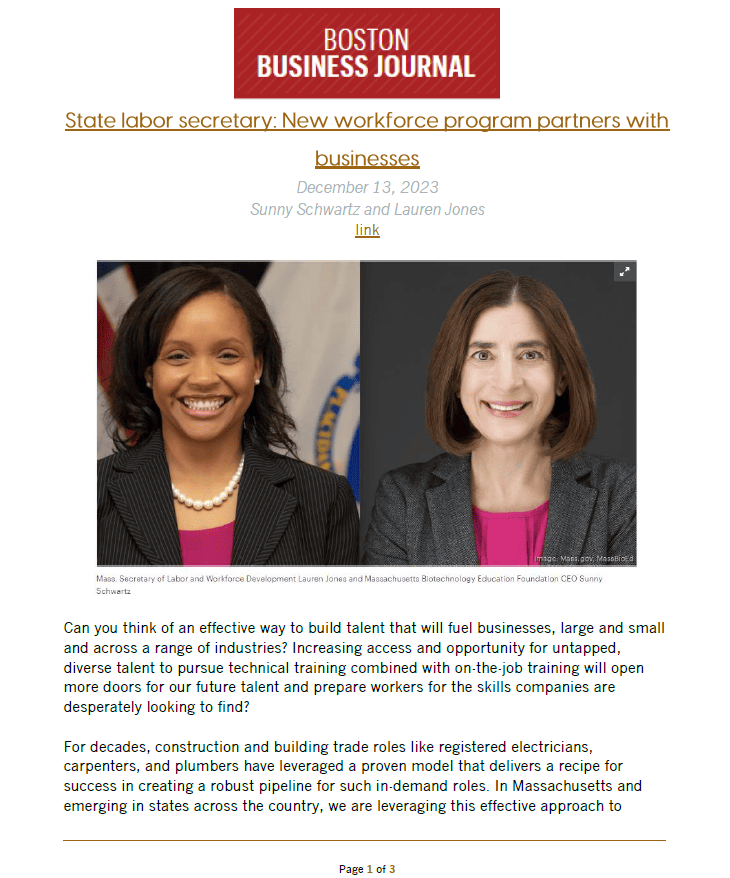News

Boston Business Journal
December 13, 2023
Can you think of an effective way to build talent that will fuel businesses, large and small and across a range of industries? Increasing access and opportunity for untapped, diverse talent to pursue technical training combined with on-the-job training will open more doors for our future talent and prepare workers for the skills companies are desperately looking to find?
For decades, construction and building trade roles like registered electricians, carpenters, and plumbers have leveraged a proven model that delivers a recipe for success in creating a robust pipeline for such in-demand roles. In Massachusetts and emerging in states across the country, we are leveraging this effective approach to expand diversity not only in the trades but also in high-growth occupations like biotechnology, financial services, IT, advanced manufacturing, and more.
So, what’s this model? It’s called Registered Apprenticeship — what sounds like heavy workforce-development jargon but is very straightforward: training that prepares individuals to gain industry-recognized credentials as a paid employee, plus on-the-job training with mentorship and supervision and wage increases commensurate with increased competency, among key elements.
Upon coming into office in January 2023, Gov. Healey and Lt. Gov. Driscoll saw the promise and opportunity to increase adoption for this proven model. And with the Legislature’s support, the Healey-Driscoll administration is now underway to increase diversity in construction and the building trades through Registered Apprenticeship and pre-apprenticeship programs because we know this works. Given how effective this has
been in construction and the building trades, the administration is also focused on placing nearly 1,000 more registered apprentices across industries including new industries in the early years of adopting Registered Apprenticeship as a hiring tool.
This is a no-brainer to help solve the workforce shortages in such industries as health care, helping to train and hire in-demand roles like certified nursing assistants and medical assistants or preparing more technicians in the life sciences and advanced manufacturing or investing in cybersecurity analysts across all industries.
As part of these efforts, technical assistance is provided by the state Executive Office of Labor and Workforce Development (EOLWD) for employers as well as access to grants and tax credits to offset training and development costs. Building on nascent resources, Governor Healey’s recently approved tax package, with the support of the Legislature, now extends attractive tax credits up to $100,000 per employer in even more expanded industries per year upon registering apprentices with EOLWD’s Division of Apprentice Standards.
We have seen the benefits, first-hand. For example, the Massachusetts Biotechnology Education Foundation (MassBioEd)—a non-profit organization dedicated to addressing the workforce needs in the state’s life sciences industry—is partnering with companies like Pfizer, Thermo Fisher Scientific and Bristol Myers Squibb to attract unemployed and underemployed individuals right here in Massachusetts to learn and earn the credentials
necessary to succeed as lab technicians and biotechnology manufacturing associates. Additionally, graduated apprentices earn competitive salaries and benefits in their respective fields while well-positioned to continue meaningful careers and achieve economic mobility for themselves and families.
What’s more, apprenticeships can lead to a pathway out of poverty for individuals and an increased tax base for government. Let’s consider graduates of MassBioEd’s program. Wages for graduates of this program more than double after program completion. Moreover, 40% of MassBioEd’s apprentices were unemployed prior to enrollment and 97% of graduated apprentices were offered a full-time permanent role with a life sciences
company. Apprenticeship also provides a pathway to employment for diverse talent, with two-thirds of MassBioEd’s apprentices self-identified as people of color, increasing opportunities for underrepresented populations in the life sciences industry.
To maintain Massachusetts’ competitive edge, we need to invest in our people including our current workers as well as the rising and untapped talent that will comprise our future workforce. As we leverage every tool in our toolbox, including Registered Apprenticeship, Massachusetts can open more doors and pathways especially for local residents living in communities across the state yet disconnected from our workforce.
Though we can attest to the benefits of Registered Apprenticeship programs, the personal testimonies shared by individuals are even more powerful—from the apprentice currently enrolled in a program who never in a million years thought this free resource could be for them; to the graduated apprentice continuing employment in one of the largest life sciences companies in the world; to the supervisor extending their knowledge to help invest in their company’s talent; or the CEO who said yes because it is not only the right thing to do but the smart thing to do to build talent.
Starting a new workforce-development program or exploring expanded ways to find talent can be a daunting task for an employer. The Healey-Driscoll Administration and its team of partners across workforce development want to collaborate with the business community to make investing in your future talent seamless — it’s a win-win for employers and the commonwealth.
More information on Registered Apprenticeship can be found on the Executive Office of Labor and Workforce Development’s Division of Apprentice Standards website. Information about MassBioEd’s Life Sciences Apprenticeship Program can be found here.
Lauren Jones is the state Secretary of Labor and Workforce Development. Sunny Schwartz is CEO of the Massachusetts Biotechnology Education Foundation.
Read Full Article on the Boston Business Journal.

 MassBioEd
MassBioEd